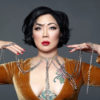Mary Louise Parker has won Emmys for portraying a marijuana-dealing suburban Mom on the hit show “Weeds” and for her role in the HBO adaptation of the play “Angels in America.”
Her debut book, “Dear Mr. You,” is written as a series of letters to men, both real and hypothetical. From family members to whatever anonymous guy farmed the oysters she once fed her Dad. Brendan recently sat down to speak with Mary-Louise about it and he first asked how she hit upon the concept.

Mary-Louise Parker: There were two pieces that I had written for Esquire, I used to write for Esquire quite a lot, and I still do from time to time. But one piece they had asked me just to write about men in general, it came out as a letter, I don’t know why but…
Brendan Francis Newnam: Like when you sat down…
Mary-Louise Parker: And it was a letter, it really honestly felt I could have written for like the next 25 years.
Brendan Francis Newnam: And that was a letter to men in general?
Mary-Louise Parker: An open letter.
Brendan Francis Newnam: OK.
Mary-Louise Parker: It appeared in the magazine, actually next to pictures of me in my underwear making a pie, which nobody really mentioned the piece to me, they really only meant to like, the underwear.
Brendan Francis Newnam: I had to read that piece to prepare for this interview, and you’re actually not wearing underwear in some of the pictures. You’re just in an apron, making pie.
Mary-Louise Parker: Correct, correct, and then I’m on the floor taking my shirt off…
Brendan Francis Newnam: I just assumed you spilled something on yourself.
Mary-Louise Parker: Exactly. I just had to take my pants off because I spilled flour.
Brendan Francis Newnam: So you wrote this, you wrote this thing…
Mary-Louise Parker: I really liked writing it, and then I wrote another piece later, they asked me to write about my father which initially, also oddly, came out as a letter– began as a letter. In the end it was, it didn’t appear in the magazine as a letter at all, but it was direct address. There was something about these two pieces that felt like the anchors of something.
Brendan Francis Newnam: So this book, although it’s a group of letters to men, it’s a memoir, so I’m wondering when-
Mary-Louise Parker: Not really.
Brendan Francis Newnam: No? OK.
Mary-Louise Parker: I mean I don’t mean to be… adversarial.
Brendan Francis Newnam: No no, I encourage…
Mary-Louise Parker: I just, I never thought of it. It never occurred to me that it was a memoir, but now that I see there’s a lot more elasticity in that term, memoir, and what that means, now I see that it does sort of qualify as a memoir, but I wasn’t over-burdened by some set of rules like, “This has to be what happens.”
Brendan Francis Newnam: So as an actor, you play a fictional character, everyone knows the rules, right? They see you on TV and they’re like “That’s not Mary Louise…” You know your friends, your family…
Mary-Louise Parker: Well supposedly but they’re still trying to give me pot in the streets so, I don’t know.
Brendan Francis Newnam: Because you did an excellent job and you were in that role for many, many years. But I’m saying in books you maybe something different’s gonna happen here because it’s filled with a lot of revelatory information if one were to read it that way.
Mary-Louise Parker: I can’t really weigh myself down with other peoples’ narratives about my life, or their assumptions…
Brendan Francis Newnam: So that wasn’t a concern of yours, right?
Mary-Louise Parker: Well I was also in control of it, you get so accustomed to people misrepresenting you or misquoting you… there was a real luxury in being able to be the architect of what people were going to…
Brendan Francis Newnam: …Actually get to see, like this interview we’re all edited to make it sound how I want.
Mary-Louise Parker: Exactly.
Brendan Francis Newnam: No one of the good things about radio it’s a little trickier to do that than it is in print.
Mary-Louise Parker: Everyone looks hot on the radio, that’s nice.
Brendan Francis Newnam: That’s why I chose this gig, thanks.
Mary-Louise Parker: You look pretty good.
Brendan Francis Newnam: Oh, why thank you. So it sounds like the Esquire idea was maybe the seed of those letters, but you did follow through, and it is all about men, or they’re all letters to men, men in your life. Was that simply because that was the initial idea? Or once you started to do it, you were like “You know, this is a fun thing.” Like why…
Mary-Louise Parker: I think partially it was because what was unleashed when I started to write that open letter to men that just felt so, I don’t know…
Brendan Francis Newnam: You had a lot to say.
Mary-Louise Parker: …Just felt so bottomless. And also the other piece — which is my father — which is why things male and are so… I’m so drawn to that. And I had an extremely charismatic and heroic and tremendous father. I was really lucky, and that’s part of the reason why I have always sought a certain kind of male approval, or why I have always been very passionate about men, you know like… drawn to them as friends and as lovers and– I think that he had so much to do with it.
And, in many ways, the book is really about him and about, at the end of the book, because it’s about the man that we don’t know who also affects us, who we’ll never meet, who will never know us, and who we never stopped to thank. And it’s less to me a memoir of then, a bunch of thank you notes.
Brendan Francis Newnam: Did you see any patterns about masculinity generally, or about at least the men you’ve gravitated towards in your life?
Mary-Louise Parker: I saw some of my own patterns, and it’s massively liberating to see where you’ve had a hand in something that caused you pain, or it caused you discomfort. If you could see it specifically. “Oh I did this, which brought that.” Or “I asked for this” or “I allowed that again and again.” And to see that and to sort of see that on a bigger scale was really useful, not that I’m going to change [laughs], but it was useful!


